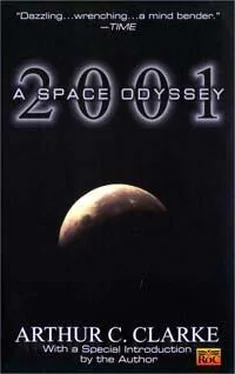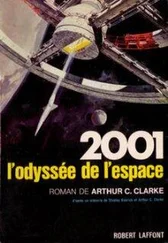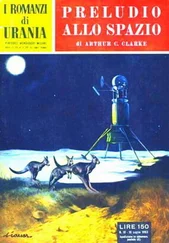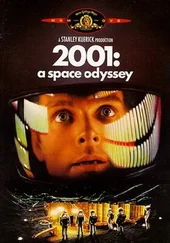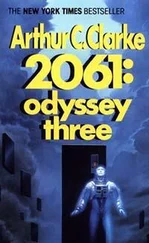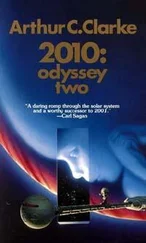They waited while the project supervisor and two of his assistants emerged from the airlock, then walked slowly toward the crater. By the time they had reached it, a thin bow of unbearable incandescence had thrust itself above the eastern horizon. Though it would take more than an hour for the sun to clear the edge of the slowly turning moon, the stars were already banished. The crater was still in shadow, but the floodlights mounted around its rim lit the interior brilliantly. As Floyd walked slowly down the ramp toward the black rectangle, he felt a sense not only of awe but of helplessness. Here, at the very portals of Earth, man was already face to face with a mystery that might never be solved. Three million years ago, something had passed this way, had left this unknown and perhaps unknowable symbol of its-purpose, and had returned to the planets – or to the stars.
Floyd's suit radio interrupted his reverie. "Project supervisor speaking. If you'd all line up on this side, we'd like to take a few photos. Dr. Floyd, will you stand in the middle – Dr. Michaels – thank you. No one except Floyd seemed to think that there was anything funny about this. In all honesty, he had to admit that he was glad someone had brought a camera; here was a photo that would undoubtedly be historic, and he wanted copies for himself. He hoped that his face would be clearly visible through the helmet of the suit.
"Thanks, gentlemen," said the photographer, after they had posed somewhat self-consciously in front of the monolith, and he had made a dozen exposures.
"We'll ask the Base Photo Section to send you copies." Then Floyd turned his full attention to the ebon slab – walking slowly around it, examining it from every angle, trying to imprint its strangeness upon his mind.
He did not expect to find anything, for he knew that every square inch had already been gone over with microscopic care.
Now the sluggish sun had lifted itself above the edge of the crater, and its rays were pouring almost broadside upon the eastern face of the block. Yet it seemed to absorb every particle of light as if it had never been.
Floyd decided to try a simple experiment; he stood between the monolith and the sun, and looked for his own shadow on the smooth black sheet. There was no trace of it. At least ten kilowatts of raw heat must be falling on the slab; if there was anything inside, it must be rapidly cooking.
How strange, Floyd thought, to stand here while – this thing – is seeing daylight for the first time since the Ice Ages began on Earth. He wondered again about its black color; that was ideal, of course, for absorbing solar energy. But he dismissed the thought at once; for who would be crazy enough to bury a sunpowered device twenty feet underground?
He looked up at the Earth, beginning to wane in the morning sky. Only a handful of the six billion people there knew of this discovery; how would the world react to the news when it was finally released? The political and social implications were immense; every person of real intelligence – everyone who looked an inch beyond his nose – would find his life, his values, his philosophy, subtly changed. Even if nothing whatsoever was discovered about TMA-1, and it remained an eternal mystery, Man would know that he was not unique in the universe. Though he had missed them by millions of years, those who had once stood here might yet return: and if not, there might well be others. All futures must now contain this possibility.
Floyd was still musing over these thoughts when his helmet speaker suddenly emitted a piercing electronic shriek, like a hideously overloaded and distorted time signal. Involuntarily, he tried to block his ears with his spacesuited hands; then he recovered and groped frantically for the gain control of his receiver. While he was still fumbling four more of the shrieks blasted out of the ether; then there was a merciful silence.
All around the crater, figures were standing in attitudes of paralyzed astonishment. So it's nothing wrong with my gear, Floyd told himself; everyone heard those piercing electronic screams.
After three million years of darkness, TMA-1 had greeted the lunar dawn.
A hundred million miles beyond Mars, in the cold loneliness where no man had yet traveled, Deep Space Monitor 79 drifted slowly among the tangled orbits of the asteroids. For three years it had fulfilled its mission flawlessly – a tribute to the American scientists who had designed it, the British engineers who had built it, the Russian technicians who had launched it. A delicate spider's-web of antennas sampled the passing waves of radio noise – the ceaseless crackle and hiss of what Pascal, in a far simpler age, had naively called the "silence of infinite space." Radiation detectors noted and analyzed incoming cosmic rays from the galaxy and points beyond; neutron and X-ray telescopes kept watch on strange stars that no human eye would ever see; magnetometers observed the gusts and hurricanes of the solar winds, as the Sun breathed million-mile-an-hour blasts of tenuous plasma into the faces of its circling children. All these things, and many others, were patiently noted by Deep Space Monitor 79, and recorded in its crystalline memory.
One of its antennas, by now unconsidered miracles of electronics, was always aimed at a point never far from the Sun. Every few months its distant target could have been seen, had there been any eye here to watch, as a bright star with a close, fainter companion; but most of the time it was lost in the solar glaze.
To that far-off planet Earth, every twenty-four hours, the monitor would send the information it had patiently garnered, packed neatly into one five-minute pulse. About a quarter of an hour late, traveling at the speed of light, that pulse would reach its destination. The machines whose duty it was would be waiting for it; they would amplify and record the signal, and add it to the thousands of miles of magnetic tape now stored in the vaults of the World Space Centers at Washington, Moscow, and Canberra.
Since the first satellites had orbited, almost fifty years earlier, trillions and quadrillions of pulses of information had been pouring down from space, to be stored against the day when they might contribute to the advance of knowledge. Only a minute fraction of all this raw material would ever be processed; but there was no way of telling what observation some scientist might wish to consult, ten, or fifty, or a hundred years from now. So everything had to be kept on file, stacked in endless air-conditioned galleries, triplicated at the three centers against the possibility of accidental loss. It was part of the real treasure of mankind, more valuable than all the gold locked uselessly away in bank vaults.
And now Deep Space Monitor 19 had noted something strange – a faint yet unmistakable disturbance rippling across the Solar System, and quite unlike any natural phenomenon it had ever observed in the past. Automatically, it recorded the direction, the time, the intensity; in a few hours it would pass the information to Earth.
As, also, would Orbiter M 15, circling Mars twice a day; and High Inclination Probe 21, climbing slowly above the plane of the ecliptic; and even Artificial Comet 5, heading out into the cold wastes beyond Pluto, along an orbit whose far point it would not reach for a thousand years. All noted the peculiar burst of energy that had disturbed their instruments; all, in due course, reported back automatically to the memory stores on distant Earth.
The computers might never have perceived the connection between four peculiar sets of signals from space-probes on independent orbits millions of miles apart. But as soon as he glanced at his morning report, the Radiation Forecaster at Goddard knew that something strange had passed through the Solar System during the last twenty-four hours.
Читать дальше
